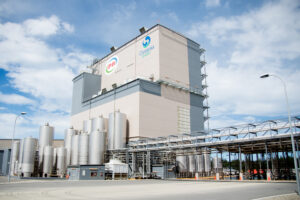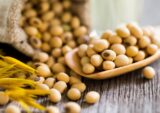 Major Chinese milk processor Yili has ambitious goals for it business development. IDM spoke with Dr. Zhanyou Yun, Assistant President of the Yili Group, about import, growth and economy.
Major Chinese milk processor Yili has ambitious goals for it business development. IDM spoke with Dr. Zhanyou Yun, Assistant President of the Yili Group, about import, growth and economy.
IDM: Yili ranks quite high amongst the world’s top dairy companies. What exactly can you deduce from a such a ranking position? Is it just size that matters?
Yun: In 2021, Yili successfully retained its ranking among the Top 5 brands on Rabobank’s 2021 Global Diary list. The ranking allows Yili to have a clear view of its position in the global context, thereby generating further motivation for its future development.
Pan Gang, Chairman of Yili Group, said, “We not only seek high growth in performance, but also the common prosperity of commercial values and social values.” In the context of the pandemic, Yili has continued to strengthen its competitiveness throughout the entire industry chain, including the supply chain, products, and channels. Behind the scale of growth, Yili adheres to innovation, strict quality control, and a global network of qualified resources, while pursuing sustainable development goals and corporate social values. Yili is committed to becoming one of the most trustworthy healthy food providers worldwide.
IDM: What are the growth ambitions of Yili, are there any special categories which Yili wants to grow? And where are the global focus areas for growth?
Yun: Yili has led the Asian dairy industry for eight consecutive years. Looking ahead, we will join hands with global partners to facilitate cooperation throughout the whole industry chain to boost a “global health ecosystem. Yili will move steadily towards a higher level of development.
In the dairy section, Yili’s liquid milk and yogurt have maintained solid market share, while continually expanding into other market segments. Products such as Satine A2β-Casein Organic Pure Milk and Yili ZhenNong High-Calcium Milk were launched to meet consumers’ diversified needs. For future development, milk powder, low-temperature liquid milk, and cheese are among the key fields. We have developed and rolled out several high-end infant formula milk powder products, such as Jinlingguan ZhenHu, RuiHu, Seine Mouiller, and Uitstekend Geitenmelk, which are now popular among consumers. In the non-dairy section, more new plant-based beverage products under the brand of PLANT SELECTED are in development, and Inikin Yike Live Fountain natural mineral water is being produced at full capacity and being sold via both online and offline channels.
Currently, our overseas markets are mainly in the Asia-Pacific region. We will gradually develop international markets such as Southeast Asia and Africa to serve more consumers around the world. By the end of this year, our factory in Indonesia will be put into operation, producing dairy products, especially ice cream, to meet large demand in Southeast Asia.
IDM: Is Yili processing solely own milk or do you also make use of imported milk or whey powders, respectively MPC or WPC?
 Yun: Yili actively combines high-quality resources all over the world for better products. We have milk supply from the world’s golden milk source belt across Asia, Europe, Oceania, and America.
Yun: Yili actively combines high-quality resources all over the world for better products. We have milk supply from the world’s golden milk source belt across Asia, Europe, Oceania, and America.
In New Zealand, three billion RMB was invested to build the Yili Oceania Dairy Production Base. Yili later purchased Westland Milk Products, the second largest dairy enterprise in the local market, and has continuously enhanced cooperation with local farms. High-quality milk sources from New Zealand are used in products such as Satine New Zealand High-End Organic Milk and Jinglingguan RuiHu Milk Powder, providing consumers with more choices.
Imported whey powder, MPC, and WPC are currently used as ingredients in infant formula milk powder, yogurt, ice cream, and so on.
IDM: How is Yili’s cheese business doing?

Yun: Yili has set up a business unit for cheese. In the first half of 2021, the retail market share of Yili cheese products increased by 6.7 percentage points YoY, and the retail sales more than tripled over the same period. Yili now has products such as Cheese Bar for Kids, Wonderful Cheese Pocket Cheese Bar for Adults, and Mozzarella Shredded. In 2020, Yili launched a series of professional dairy products named “Oriental Inspiration”. In the field of reprocessed cheese, Yili innovatively developed and launched the “squeezable cheese” which contains five times the calcium of milk and dietary fiber that help children digest better.
The cheese market has strong growth prospects in China, and it will be one of our key businesses. Driven by the upgrading of consumption and consumer trends shifting towards health, the nutritional value of cheese has been gradually recognized by Chinese consumers. Accordingly, there is an ongoing transition from “drinking milk” to “eating milk”. While the catering, hotel, and baking industries are developed rapidly and use cheese as an important food ingredient, there are major opportunities for the cheese business to grow further.
IDM: Looking at the Chinese economy: what is the influence of the government in Yili’s decisions and strategy?
Yun: Yili abides by local laws and regulations and fulfils its corporate social responsibilities both in China and other markets.
The Healthy China 2030 Plan sets out China’s long-term approach to promote public health and fitness and upgrade the related industries. Dairy products and other healthy foods, which provide abundant nutrition, are important to healthy living. Yili will take advantage of the improving industrial chain and invest more in R&D to provide consumers with more diversified product choices.
The Chinese government has announced the goals of achieving peak carbon emissions by 2030 and carbon neutrality by 2060. In response to the national climate goals, Yili has undertaken corresponding social responsibilities. We have taken the lead in committing to achieving carbon neutrality on schedule through a series of actions, such as improving energy efficiency, reducing greenhouse gas emissions on farms, and building green factories. In 2021, Yili launched the official Carbon Neutralization Project, measuring the carbon footprint of liquid milk, ice cream, milk powder, yogurt, and other product lines through their whole life cycle.



